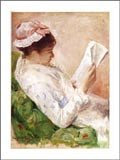 The Witch of Painted Sorrows by M.J. Rose
The Witch of Painted Sorrows by M.J. RoseMy rating: 4 of 5 stars
M.J.Rose writes lush, evocative, sensual, smooth prose that brings the reader through a labrynthine multiple-timeline, filled with art, history, satin, velvet, and the pervasive scent of violets. The Witch is La Lune, a 16th-century courtesan whose passion for art and life illuminated her own live, and has captivated the lives of all of the women in Maison de la Lune house for centuries.
Sandrine is an American woman who has fled her abusive husband at the end of the 19th century. She goes to her grandmother's house, the Maison. Grandmother is a courtesan, one of a line that has charmed generations of generous men with wit and intellect. She is also a pragmatist, and she discourages Sandrine's growing passions for painting and her own architect, Julien, whose Art Nouveau style has begun to challenge Parisian standards of beauty in the Belle Epoque.
At first, Sandrine reads The Portrait of Dorian Gray while her grandmother holds her salons. Soon, though, she begins to explore the ornate mansion, and devises an audacious plan to force the Ecole des Beaux-Arts to accept her as its first female student.
Many worlds collide in this novel: Cabala and alchemy v. pragmatism and reason, duty v. passion (beautifully rendered in erotic interludes and transgressive art), fictional characters v. cameo appearances by Gustav Moreau, Debussy, Satie, and others. Can a long-dead enchantress overpower and inhabit a modern woman? Where does imagination end and possession begin?
I read this heady novel slowly, savoring and admiring the author's immersion in the details of houses, paintings, philosophers, folklore, and the customs of the courtesans. That I sensed the depth or research instead of becoming immersed as a reader is one of the flaws of this novel. The other is that the ending, after all of the struggles, seemed abrupt.
Still, 4 stars.
I received this book from NetGalley in exchange for a fair review.
View all my reviews



